I’m Donating My Kidney. Will You Donate $100?
Late last year, I donated my spare kidney to someone I don’t know. And one day, I hope you’ll consider doing the same. But in the meanwhile, I have a different request: could you help fund these great organizations - the South Asian American Digital Archive, and the Secular Student Alliance - with a donation of your own?
Secular Student Alliance
I joined the SSA Board because I remember what it was like to be a secular student. It was lonely. I grew up in rural Michigan, and everyone seemed to believe in God, which never made sense to me. I listened to sermons; I attended Vacation Bible School; I tried to read the Bible. And as I got older, I watched the adults in church pray and commune and reaffirm their faith. I didn’t have anyone to share my doubts with; to understand my lack of faith; to reaffirm me. I was alone, and I felt it. And I knew that staying silent was the smart move - sharing this part of me would invite scorn, or ridicule, or reprimand. All of which reinforced my loneliness.
Today, students across the country are facing the same challenges; the same feeling that they’re isolated, different, alone. But they’re not alone. The Secular Student Alliance connects secular students with each other – and with resources, leading secular thinkers, and a vibrant nationwide community. I wish I’d been a part of this community when I was younger – and I’m so glad that others have access to it now.
Your donation makes all this possible. It’s a way of reaffirming secular students – and just as importantly, a pluralistic, welcoming future for us all.
SAADA
The South Asian American Digital Archive documents, preserves, and shares the story of the South Asian American experience. That shared experience is a tapestry of individual stories, feelings and events – every one unique, personal, and fascinating. Looking through the archive is an opportunity to see things differently; to understand things you didn’t before.
What was it like to be in the 60s Girl Scouts, in Minnesota, as a South Asian girl? Nayana can tell you.
What was it like to be shot in the face after 9/11, out of “revenge” – and then campaign to save the life of the man who shot you? Rais can tell you.
To be expelled from Uganda by Idi Amin, and resettle in South Carolina? To grow up gay in Pakistan in the 40s and 50s? To win a commendation from the Queen for your energy conservation work?
These are the sorts of stories you can read and listen to, precisely because SAADA has done the work of collecting them in an online archive. And not just stories: primary documents, family photos, newspaper clippings, correspondence, home movies, and all sorts of other media.
It’s difficult archival work – but important for understanding the South Asian story, and the American story. For understanding what it means to be us.
Why Am I Donating My Kidney?
Because I don’t believe that anyone is expendable.
That belief – that people matter – has motivated much of my career. I’ve spent years working on climate change, environmental health, and environmental justice. Because pollution isn’t abstract; it’s personal. The question really is: who suffers? And almost always, the answer is: the most vulnerable people; the most powerless; the people our society disregards. And sadly, that moral wrong – poisoning vulnerable people – often compounds other forms of suffering and injustice.
Even so, it’s taken me 20 years to give up my spare kidney. I first thought about it when the friend of a friend needed one to survive. I considered getting tested to see if we were a match. But I chose not to, because I worried that we might actually match. And I didn’t want to feel pain or assume risk for a complete stranger. Couldn’t they find someone else?
It took years, but that decision gnawed at me. It seemed to conflict with the work I’d been doing all my life. Eventually I started researching kidney donation – at first casually, and then with increasing purpose. I learned that the surgery is actually quite safe. That it doesn’t take long to recover. That afterwards, you can go back to your normal life.
My fears receded, and my sense of moral obligation grew. Surely I could endure a few days of discomfort so that someone else could live.
My Experience
My surgery is scheduled for November 30, 2022. I’ll post updates here as I have them, but I likely won’t circulate this donation page widely until my surgery is over. In the meanwhile, this is an outdated (but still informative) overview of what the donation experience is like.
Update: Here I am just before they wheel me in for the surgery:
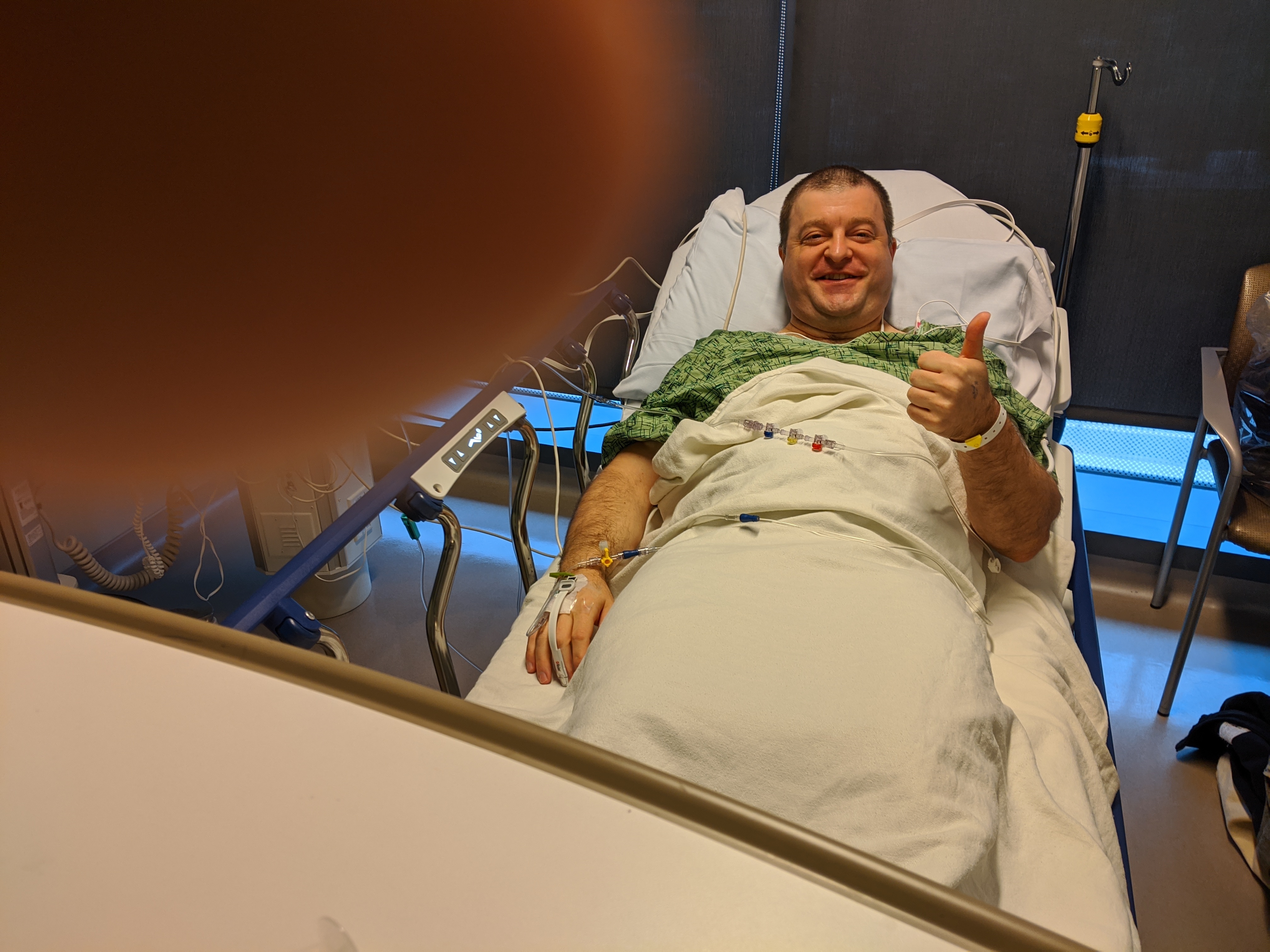
In the days before this moment, what I recall feeling is nervous anticipation. My biggest worry was that I would contract Covid - or my recipient would - and everything would have to be rescheduled. Major bummer! Especially since my Dad and I flew across the country for this; I'm donating at UC San Diego. So I didn't sleep well before my early-morning surgery - but fortunately, everything turned out well.
Incidentally, all this is costing me very little. All the medical costs - the operation, testing, and whatnot - is covered, in full, by Medicare. That's true for all kidney donors, not just me. My own health insurance doesn't have to pay a thing, and I certainly don't.
My travel would be less expensive if I donated in Ann Arbor, where I currently live. But I first started exploring kidney donation years ago, when I lived in San Diego. And I got approved - but then Covid intervened, and I moved, and donation no longer made as much sense. Now that I'm following through, I wanted to do so with the doctors and staff that I already got to know.
Fortunately, UC San Diego is part of the National Kidney Registry. Their Donor Shield program reimburses up to $5,000 in travel and lodging expenses for the kidney donor (me) and a friend or family member (my Dad). That's covering our flights, our Lyft rides, and our Airbnb stay.
Here I am a few hours after the surgery:
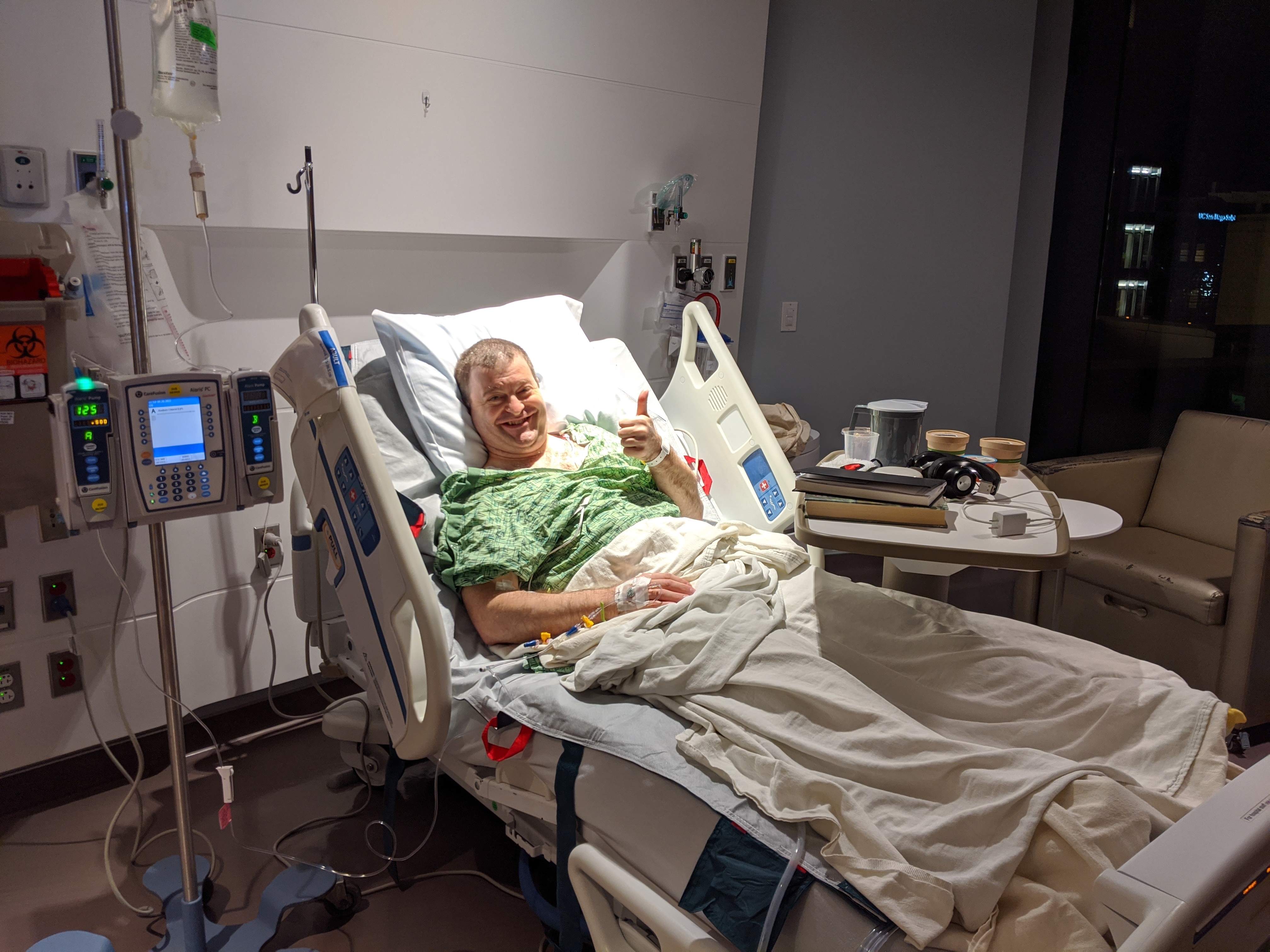
I don't remember the surgery itself, for obvious reasons. I'm told it took about four hours. After I woke up, I chatted with my Dad for a while, and then my doctors gave me permission to go for a walk. This was exciting, as I'm told that walking is the best thing I can do for my health after this surgery. It reduces the risk of blood clots, helps restart my GI system, and helps my body absorb the carbon dioxide used by my doctors during the surgery.
I did my first lap of the ward with the help of a walker and a nurse. After that, I used my IV stand for support, and I was allowed to wander on my own. I spent two hours walking that first evening.
All of my nurses were wonderful - kind, competent, empathetic. Even so, this was a hospital, so I didn't sleep well that first night. Given the poor sleep I'd had before the surgery, and the surgery itself, I was pretty exhausted by this point.
And so I wanted to get discharged, and go back to my Airbnb, where I could get some dark, quiet, uninterrupted shut-eye. To do so, I'd have to defy the odds - most people stay in the hospital for two days after this surgery. So I kept walking: I spent three hours doing laps the day after my surgery. And I think it really helped; I felt better and better, despite my exhaustion. Soon they let me start eating solid foods, and I was able to meet the other milestones they set for my discharge. And then, they let me go.
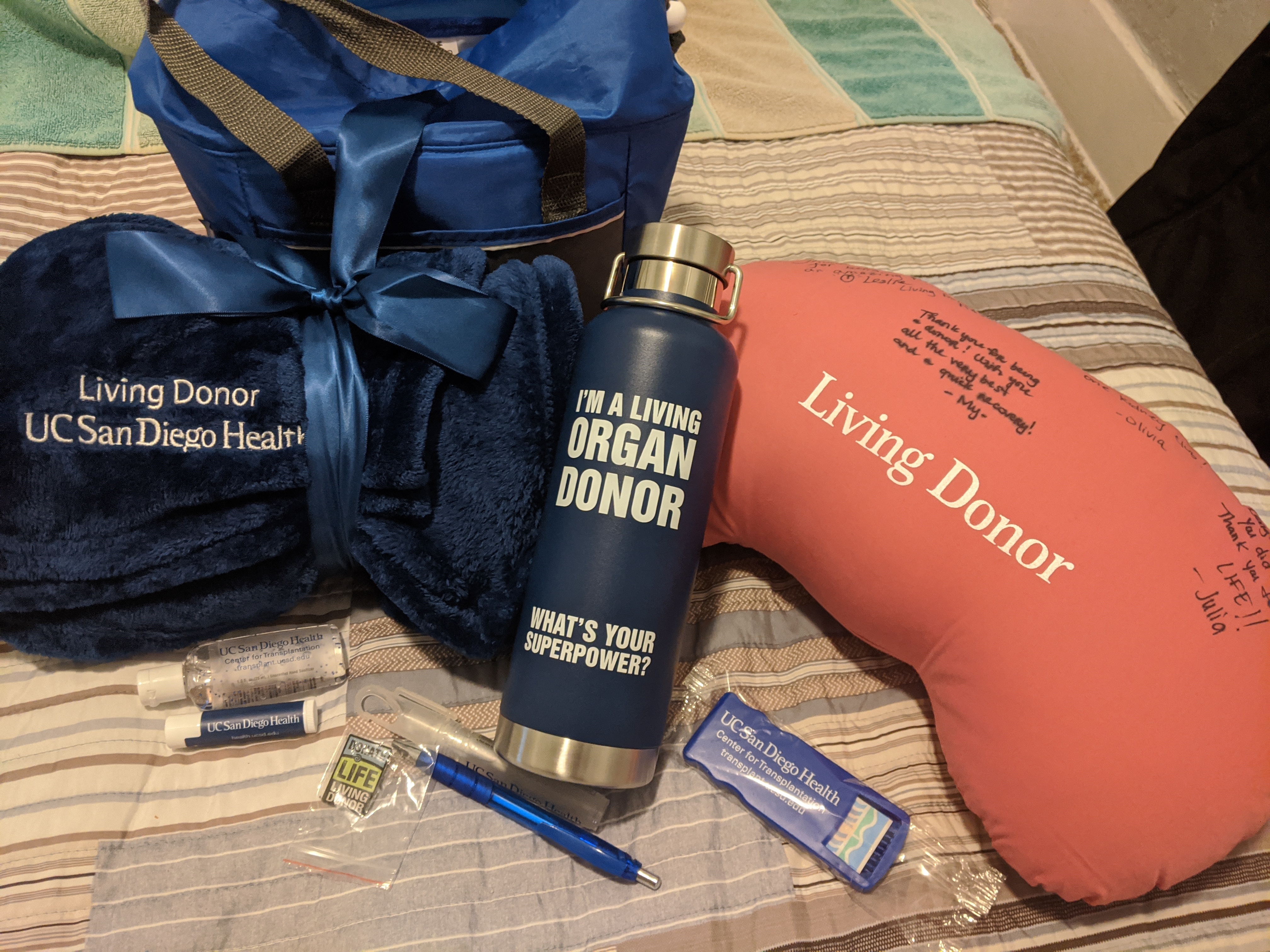
But not before giving me some unexpected swag: a pillow signed by some of the staff, a blanket, and a cool water bottle. I was touched; I hadn't expected anything. But it made me feel cared for. And it was an appropriate way to see me off, because throughout the process, in my interactions with the staff, doctors, and nurses, that's what I felt - cared for.
Update: Apologies in advance if you feel squeamish, but I asked my surgeon to take some pictures of my kidney, while I was under. And here it is! Mostly shrouded in a layer of protective fat, and a bit larger than usual. I'm told it was flown to Arizona where the recipient was waiting, and the transplant was completed later that same day.
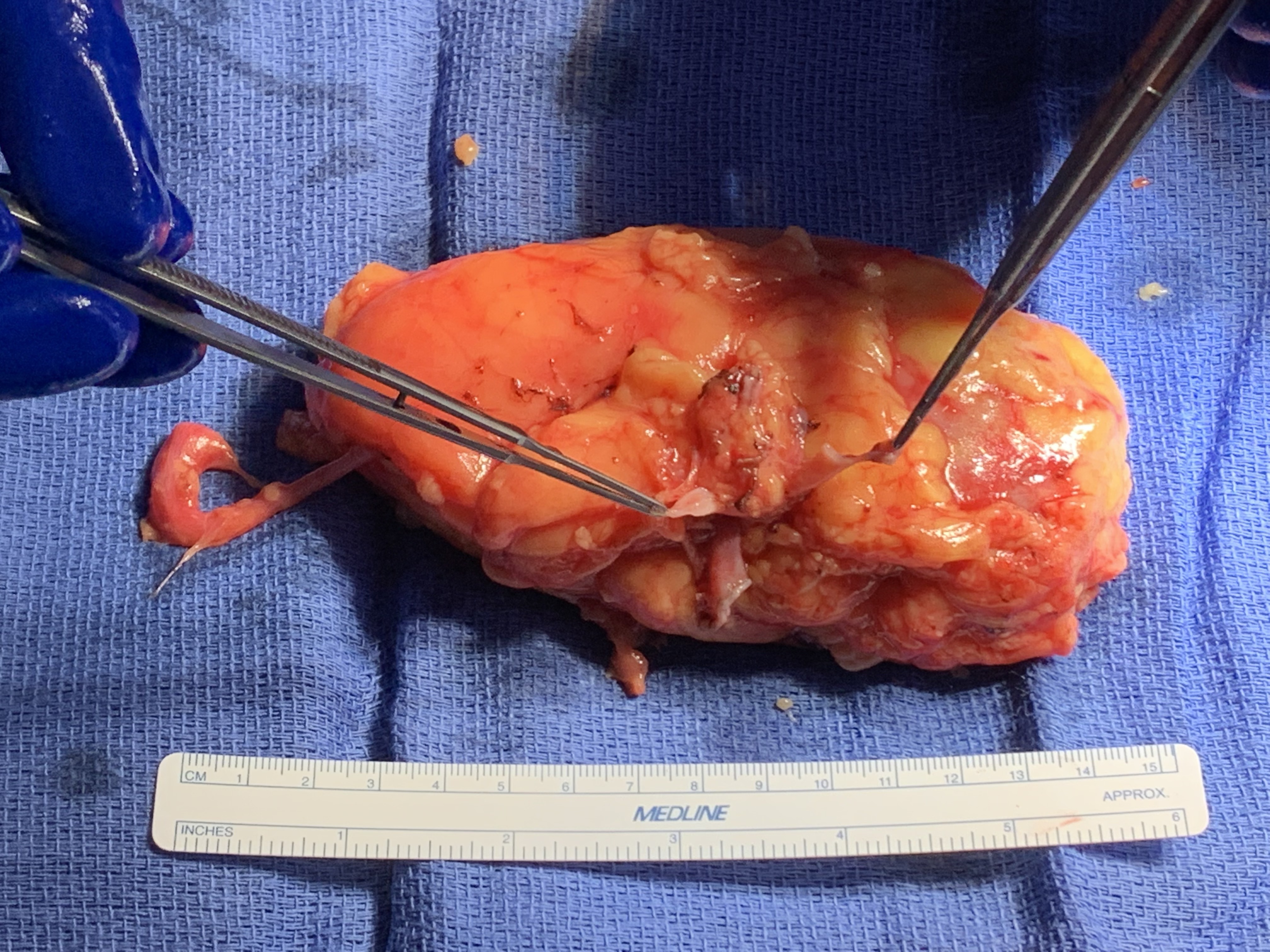
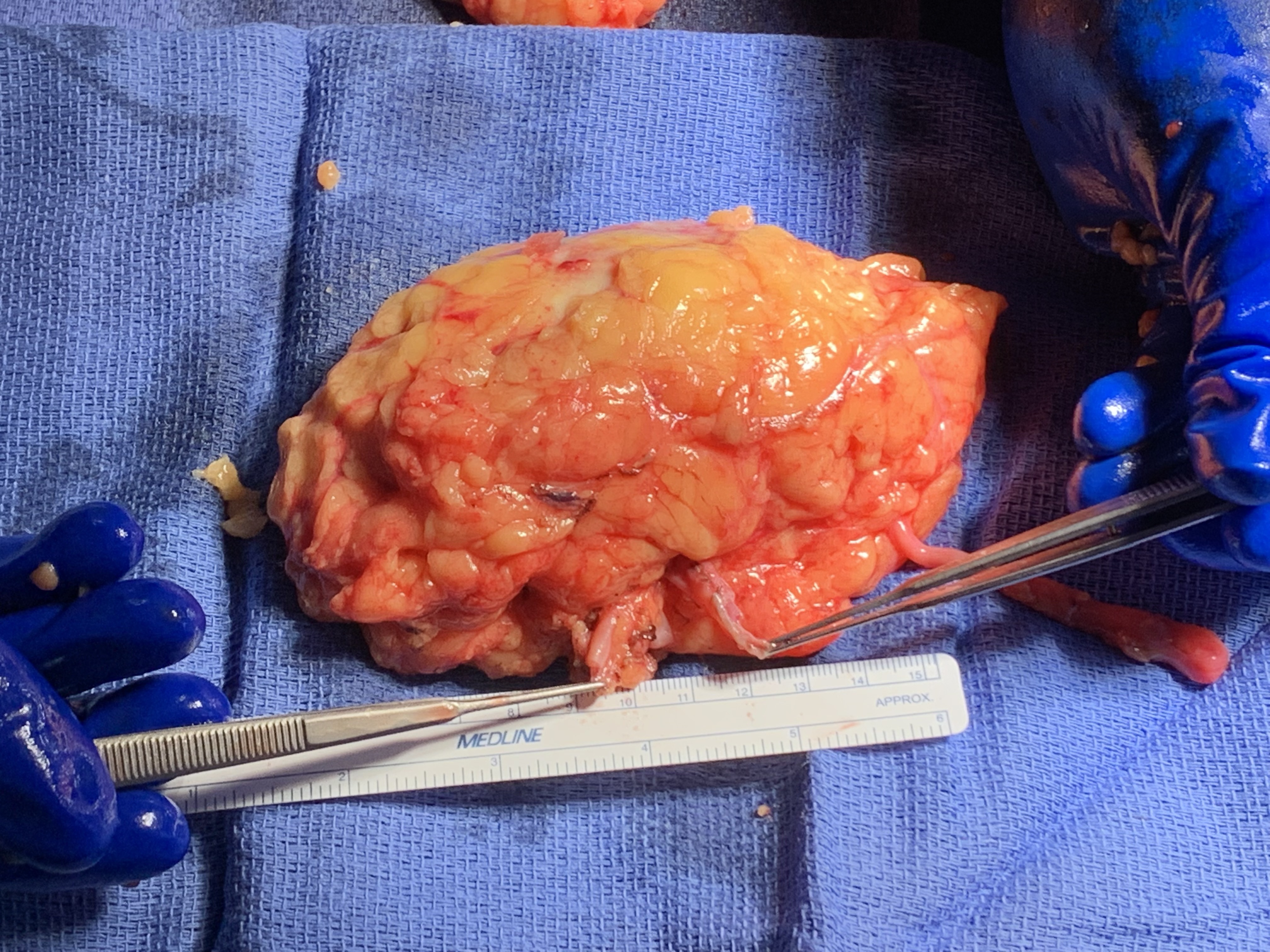
Update: I just passed the six-week mark since my surgery, and I’m feeling great; fully back to normal. That’s what the labs confirm too – I’ll never be able to filter as much creatinine with one kidney as I did with two, but my levels are continuing to improve, as my remaining kidney grows in size (crazy, right?). And everything else is back to normal. It’s easy to forget I had the surgery at all; I often do.
If you’re curious about the pain, that’s easy to forget too. The first day wasn’t too bad; the exhaustion was worse than the pain, partially because of the narcotics they were giving me. But I was eager to get off of those – and honestly, walking a lot helped me do so. After the fifth day, the only thing I was taking was Tylenol – and even after the first day, I wasn’t taking much more than that (I relied heavily on a warming pad, and lidocaine patches also helped a lot). And then I started to forget to take my Tylenol – a good sign that I just didn’t need it anymore.
Why Me? Why You?
I want to live in a better world – a world with less suffering, more understanding, more justice. I hope that you do, too.
It takes time and effort, but I believe that we can build that better world; that what we do can impact the people around us, for the better.
I know this is true because I’ve done so, and because as an organizer, I’ve helped other people do so. And as I’ve gotten older and more mature, I’ve come to feel more deeply that love and understanding and tolerance – caring about the person next to you – is what gives life meaning, and that it both represents and enables the very best in us.
In turn, I’m asking you to care about people you may never meet – those touched by the organizations you’ll be funding. Kindness is always a generosity; it’s always a gift. I hope you’ll consider sharing your own kindness and generosity by donating to the Secular Student Alliance and SAADA right now.
Contribution rules
- Charitable donations made through this form are received and processed by ActBlue Charities, Inc., a 501(c)(3) tax-exempt organization formed to democratize charitable giving, and are subject to ActBlue’s Terms of Service and Privacy Policy. The merchant of record for this transaction is ActBlue Charities, Inc. We subsequently give your contribution to the organization or cause that you have selected on the contribution form within 30 days. A copy of our latest financial report may be obtained by contacting us at actblue.com/contact or calling (617) 517-7600. Alternatively, our report detailing our programs, a financial summary, and the percentage of contributions dedicated to our charitable purpose, along with a copy of our license, may be obtained from the following state agencies: FLORIDA (registration #CH46938) – A COPY OF THE OFFICIAL REGISTRATION AND FINANCIAL INFORMATION MAY BE OBTAINED FROM THE DIVISION OF CONSUMER SERVICES BY CALLING TOLL-FREE, 1-800-435-7352 (800-HELP-FLA) WITHIN THE STATE OR VISITING www.FloridaConsumerHelp.com; GEORGIA (registration #CH012361) – contact ActBlue Charities; MARYLAND (registration #29971) – For the cost of copies and postage, documents and information filed under the Maryland charitable organizations laws can be obtained from the Office of the Secretary of State, State House, Annapolis, MD 21401; MISSISSIPPI (registration #100024326) – Secretary of State’s Office 1-888-236-6167; NEW JERSEY (registration #CH3867000) – INFORMATION FILED WITH THE ATTORNEY GENERAL CONCERNING THIS CHARITABLE SOLICITATION AND THE PERCENTAGE OF CONTRIBUTIONS RECEIVED BY THE CHARITY DURING THE LAST REPORTING PERIOD THAT WERE DEDICATED TO THE CHARITABLE PURPOSE MAY BE OBTAINED FROM THE ATTORNEY GENERAL OF THE STATE OF NEW JERSEY BY CALLING (973) 504-6215 AND IS AVAILABLE ON THE INTERNET AT http://www.state.nj.us/lps/ca/charfrm.htm; NEW YORK (registration #45-25-27) – New York Attorney General’s Charities Registry at www.charitiesnys.com or, the Office of the Attorney General, Charities Bureau, 28 Liberty Street, New York, NY 10005, or (212) 416-8686; NORTH CAROLINA (registration #SL009830) – FINANCIAL INFORMATION ABOUT THIS ORGANIZATION AND A COPY OF ITS LICENSE ARE AVAILABLE FROM THE STATE SOLICITATION LICENSING BRANCH AT 1-888-830-4989.; PENNSYLVANIA (registration #104758) – Department of State, 800-732-0999; VIRGINIA – Virginia State Office of Consumer Affairs, Department of Agricultural and Consumer Services, PO Box 1163, Richmond, VA 23218; WASHINGTON (registration #37969) – Secretary of State, Charities Division, Olympia, WA 98504-0422, 800-332-4483; WEST VIRGINIA (registration #9826) – Secretary of State, State Capitol, Charleston, WV 25305; WISCONSIN (registration #16203-800) – contact ActBlue Charities. Registration with and reporting to these agencies does not imply endorsement, approval, or recommendation of ActBlue Charities.
- By making a contribution, you attest that the contribution is made from your own funds or the funds of an authorizing corporation or other entity, and the funds are not being provided by any other person or entity.